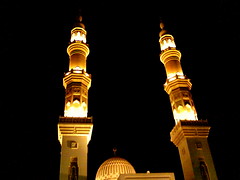The last test of the nine weeks puts the focus on class web site notes and on analytical reading. There will be 20 multiple-choice questions - covering material from Sept 26 through October 9 - and an essay question callinf for a comparison between New Orleans and New York.
Next week we return to SW Asia to study a potent and growing world force: Islam. A parallel study is petroleum and its production. And we'll be watching a classic movie to add body the story: Lawrence of Arabia.
The illustration focuses on minarets, an architectural symbol for Islam. The call to prayer customarily emanates from a muezzin, a prayer leader who broadcasts the prayers from the minaret.
“Imagine 20 years of this,” NY Times, 9-25-05, Donald McNeil
1. icon
2. portent
3. harbinger
4. cartouche
5. oscillates
6. meteorological
7. sloth
8. ephemeral
9. infrastructure
10. deficit
a) basic facilities, services, and installations needed for the functioning of a community or society
b) warning sign, or omen.
c) symbol of what’s coming.
d) to rapidly move back and forth.
e) loss or debit.
f) an oblong symbol of a pharaoh.
g) image.
h) a short-lived thing.
i) having to do with the atmosphere.
j) laziness.
1) “Squalls can be tracked from their birth off the coast of Africa.” This is because a) widespread and violent conflict in Africa results in storms. b) Africa is a continent with few natural harbors. c) Africa is connected to North America and the Gulf of Mexico via wind and ocean currents.
2) “Marshes that once absorbed storms have been allowed to die off and sink.”
a) due to oil production b) due to levees along the mighty Mississippi c) due to digging of erosive ship channels. d) due to inadequate political leadership.
3) Most US refineries are located around the Gulf rim because a) that’s where all the oil is located. b) tourism advocates and environmentalists in the Pacific region and Appalachians have opposed oil facilities.
4) A cycle of severe storms may affect * investment in infrastructure improvements * investment in exploration of new technology * your economic future because the investment monies will be spent on a) terrorism protection b) debates over taxation c) hospitals and nursing homes d) storm repair.
5) Trucking, airlines, oil and __ companies have been negatively affected by the storm impact.
a) insurance b) construction c) sanitation d) meteorological.
answers:
1. icon - image
2. portent - symbol of what lies ahead
3. harbinger - something that foretells the future
4. cartouche - identifies a pharaoh
5. oscillates - vibrates
6. meteorological - referring to the atmosphere
7. sloth - laziness
8. ephemeral - vanishing quickly
9. infrastructure - basic services and facilities
10. deficit - debit
1. See the Atlantic map for the currents that connect Africa's coast with the Caribbean and Gulf.
2. Oil production; the key word is "sink," which implies subsidence and oil extraction.
3. Environmentalists and tourism advocates often oppose drilling - in many regions away from the Gulf.
4. Storm repair.
5. Insurance. We will all pay the cost through higher insurance rates.
Subscribe to:
Post Comments (Atom)


No comments:
Post a Comment